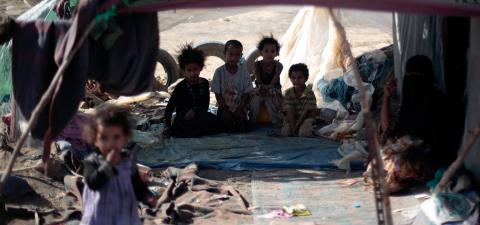Aid offers ‘only hope of survival’ in cholera epidemic in Yemen, UK official


Photo: A rubbish dump in a street in the Yemeni capital, Sana’a. A second wave of cholera has swept across 90% of the country. Photograph: Hani Mohammed/AP
Humanitarian aid is “the only hope Yemeni people have to survive”, said the UK development minister, Priti Patel. She warned Yemen is “on the brink of catastrophic disaster” unless the international community follows Britain’s lead to stem the cholera epidemic.
Heavy rains, stagnant water and overflowing rubbish bins have stoked a second wave of the outbreak, which has so far swept across 90% of the country, infecting almost half a million people and killing 1,900 since it began in 2015.
An estimated 70% of Yemen’s 28 million population is believed to be in desperate need of humanitarian aid, yet funding and medicine shortfalls have left people extremely vulnerable to disease and famine in the war-torn country.
Blame the Saudis for Yemen's cholera outbreak – they are targeting the people
Jonathan Kennedy
Read more
“Yemen is on the brink of a catastrophic disaster if the world continues to close its eyes to the urgent help three-quarters of people across the country desperately need,” said Patel, who has prioritised £8m for cholera from the budget this year for Yemen.
“UK aid is providing lifesaving food for 1.7 million people, as well as clean water, emergency healthcare and sanitation to contain the cholera outbreak and prevent it from spreading further.
“The international community must follow Britain’s lead and join our efforts and step up support to avert famine and cholera engulfing the country.”
In April, the Department for International Development (DfID) increased UK aid to Yemen to £139m for 2017-18 and has focused funds on life-saving aid, including food and nutrition support, and clean water and sanitation.
Yemen’s crisis has been deemed “the worst cholera outbreak in the world” by the World Health Organisation, with one in every 62 Yemenis believed to have been infected with the disease.
The UK’s priority funding will include £6m for Unicef and £2m for the UN’s International Organisation for Migration’s (IOM) cholera response.
Dr Sherin Varkey, deputy representative for Unicef Yemen, welcomed DfID’s renewal of support. “Every day we are seeing children suffering from this unprecedented cholera outbreak – children who have been living through more than two years of conflict and many of whom are already malnourished,” he said.
“The UK has been generous in its humanitarian support to Yemen, and Unicef welcomes DfID’s work to galvanise the support of the international community. Unicef is on the ground coordinating responses in healthcare and water, sanitation and hygiene to help children and their families affected by this epidemic.”
The closure of Sana’a airport in August last year has had a devastating impact on Yemenis’ access to medicine and healthcare, both inside and outside the country. Although 10 humanitarian flights drop off much-needed supplies and medicines in Sana’a and Aden every week, those flights are not available to Yemenis, leaving an estimated 20,000 people requiring life-saving treatment overseas, according to the UN.
Chissey Mueller, the IOM’s officer in charge in Yemen, said DfID’s fund allocation would help the organisation scale up its efforts to tackle cholera, such as expanding efforts for centres that treat diarrhoea, provide oral rehydration and train public health staff.
“The timing of this second phase [of the outbreak] is coinciding with the seasonal rains that occur every year in Yemen, but unfortunately with these rains we got the complete collapse of the health sector – which is a result of the conflict – as well as the collapse of the waste management system, which means that rubbish hasn’t been picked up in a very long time,” said Mueller by phone from Sana’a.
“So while the rains would normally run off, this year it’s become a bigger problem because the rain is stagnating, people are walking through the water, and any water sources are becoming contaminated very quickly. We’re trying to get our heads wrapped around this as we are very worried that this [outbreak] could grow quite substantially.”
The international community has also been called upon to fill the gaps in Yemen’s public health sector, by providing training, bringing in international support, or even paying Yemeni doctors and nurses who haven’t received their government salaries for months.
Even that, said Mueller, is still a sticking plaster on a conflict “now approaching three years, and doesn’t look like it’s changing any time soon”.
“There’s no way that the humanitarian agencies can fill the entire void of the doctors and nurses attached to the hospitals,” she said. “We have to focus on where the outbreak is worst.” The Guardian

Aden — Yemen Airways has announced new updates to its ticket cancellation (VOID) policy, introducing financial penalties on travel agents in…

Geneva – The United States announced that Yemen will not be among the countries benefiting from a new $2 billion funding pledge for United Na…

Paris — The French humanitarian organization Acted announced that it has delivered cash assistance to nearly 89,000 people affected by displa…